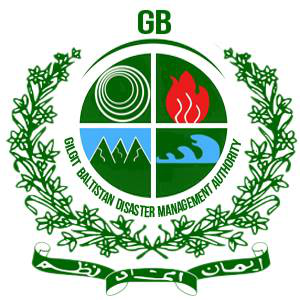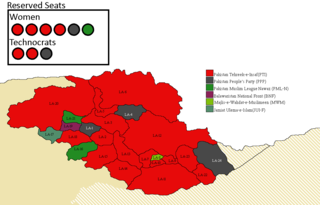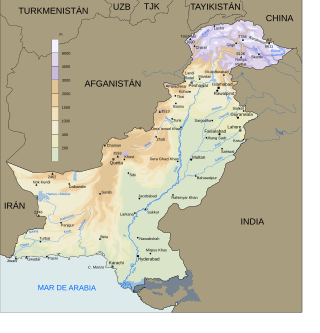Related Research Articles

Gilgit is the capital city of the Pakistani-administered administrative territory of Gilgit–Baltistan in the disputed Kashmir region. The city is located in a broad valley near the confluence of the Gilgit River and the Hunza River. It is a major tourist destination in Pakistan, serving as a hub for trekking and mountaineering expeditions in the Karakoram mountain range.

The Karakoram Highway is a 1,300 km (810 mi) national highway which extends from Hasan Abdal in the Punjab province of Pakistan to the Khunjerab Pass in Gilgit-Baltistan, where it crosses into China and becomes China National Highway 314. The highway connects the Pakistani provinces of Punjab and Khyber Pakhtunkhwa plus Gilgit-Baltistan with China's Xinjiang Uyghur Autonomous Region. The highway is a popular tourist attraction and is one of the highest paved roads in the world, passing through the Karakoram mountain range, at 36°51′00″N75°25′40″E at maximum elevation of 4,714 m (15,466 ft) near Khunjerab Pass. Due to its high elevation and the difficult conditions under which it was constructed, it is often referred to as the Eighth Wonder of the World. The highway is also a part of the Asian Highway AH4.
Abdul Hamid Khan is the chairman of the Balawaristan National Front (BNF-H), a sub-nationalist organisation. He founded the Balawaristan National Front Hameed Group (BNF-H), which sought autonomy for Gilgit-Baltistan and opposed the construction of hydroelectric dams there. BNF-H was founded in 1995 by Abdul Hamid. In 1999, Abdul Hameed Khan left Pakistan. He spent 20 years living in India and Belgium. However, after spending 20 years living abroad, Abdul Hamid unconditionally surrendered to Pakistani security officials on 8 February 2019. His organisation, BNF-H, was banned by National Counter Terrorism Authority (NACTA) on 26 February 2019.

Deosai National Park is a high-altitude alpine plain (plateau) and National Park located between Skardu District and Astore District in Gilgit-Baltistan, Pakistan.

The Hunza Valley is a mountainous valley in the northern part of the Gilgit-Baltistan region of Pakistan, formed by the Hunza River, bordering Ishkoman to the northwest, Shigar to the southeast, Afghanistan's Wakhan Corridor to the north, and the Xinjiang region of China to the northeast.

The Diamer District, also spelled Diamir District,) is a district in Gilgit-Baltistan territory of Pakistan. The headquarters of the district is the town of Chilas. The district is bounded on the north by the Tangir and the Gilgit districts, on the east by the Astore District, on the south by the Mansehra district of Pakistan's Khyber Pakhtunkhwa Province and the Neelum District of Azad Kashmir, and on the west by the Upper Kohistan District of Khyber Pakhtunkhwa Province. The Karakoram Highway passes through the Diamer District.

Gilgit-Baltistan is an administrative territory of Pakistan in the northern part of the country. It was given self-governing status on August 29, 2009. Gilgit-Baltistan comprises 14 districts within three divisions. The four districts of Skardu Kharmang Shigar and Ghanche are in the Baltistan Division, four districts of Gilgit Ghizer Hunza and Nagar districts which were carved out of Gilgit District are in the Gilgit Division and the third division is Diamir, comprising Chilas and Astore. The main political centres are the towns of Gilgit and Skardu.

Gilgit-Baltistan, formerly known as the Northern Areas, is a region administered by Pakistan as an administrative territory and constituting the northern portion of the larger Kashmir region which has been the subject of a dispute between India and Pakistan since 1947, and between India and China since somewhat later. It borders Azad Kashmir to the south, the province of Khyber Pakhtunkhwa to the west, the Wakhan Corridor of Afghanistan to the north, the Xinjiang region of China, to the east and northeast, and the Indian-administered union territories Jammu and Kashmir and Ladakh to the southeast.
The Yashkun People or Yashkuns are a sub-group of the Shina, a Dardic-speaking ethnic group, most of whom reside in the Gilgit division of Gilgit-Baltistan and Chitral and Kohistan districts of Khyber-Pakhtunkhwa, Pakistan. They speak a Dardic language called Shina and are scattered throughout northern Pakistan. Most researchers assert that the Yashkun were immigrants to northern Pakistan from Central Asia. However, other authorities maintain that the Yashkuns were indigenous to northern Pakistan.

The 2010 Salang avalanches consisted of a series of at least 36 avalanches that struck the southern approach to the Salang Tunnel, north of Kabul. They were caused by a freak storm in the Hindu Kush mountains.
August 2012 Mansehra Shia massacre refers to the massacre of 25 Shia Muslim residents of Gilgit-Baltistan travelling from Rawalpindi, Punjab to Gilgit, Gilgit Baltistan in Pakistan. The bus was stopped in Mansehra District and the people were killed after checking their identification cards which showed they were from the Shia community by individuals dressed in Military uniforms. Darra Adam Khel faction of Tehrik-i-Taliban Pakistan has claimed the responsibility for the attack.

Astore is the capital of Astore District in Gilgit-Baltistan, Pakistan. The city is situated at an altitude of 2,546 metres (8,353 ft).
Chief Minister of Gilgit Baltistan is elected by the Gilgit Baltistan Assembly to serve as the head of the provincial government in Gilgit-Baltistan for a five-year term. The current Chief Minister is Khalid Khurshid, who was elected on 1 December 2020, following the 2020 Gilgit-Baltistan Assembly election.

Gilgit-Baltistan Disaster Management Authority (GBDMA) is an organization which deals with natural or man-made disasters in Gilgit-Baltistan, Pakistan. GBDMA's mandate is to engage in activities concerning to all four stages of Disaster Management Spectrum.

The 2015 Gilgit-Baltistan Assembly elections were held on 8 June 2015. Elections were held in 24 constituencies, each electing one member to the 2nd Gilgit-Baltistan Legislative Assembly. 269 candidates contested these elections, either representing one of the political parties of Gilgit-Baltistan or being an independent candidate.

The 2020 Gilgit-Baltistan Assembly elections were held on 15 November 2020. Elections were held in 24 constituencies, each electing one member to the 3rd Gilgit-Baltistan Legislative Assembly. 330 candidates contested these elections, either representing one of the political parties of Gilgit-Baltistan or being an independent candidate.
The Babusar bus accident was the deadliest road accident in Gilgit-Baltistan history.
Muhammad Khalid Khurshid Khan is a Pakistani lawyer and politician who is the current Chief Minister of Gilgit-Baltistan, a de facto province of Pakistan, from the Pakistan Tehreek-e-Insaf. He has been a member of the Gilgit Baltistan Assembly since 25 November 2020.
The Supreme Appellate Court Gilgit-Baltistan is the highest court of appeal in the region of Gilgit Baltistan, Pakistan. It consists of a Chief Justice and two other Judges. The Court was established in 2009 under Gilgit-Baltistan 2009 and has the similar jurisdiction equal to the Supreme Court of Pakistan. The Permanent Seat of the Court is at Gilgit, but the Court also sits from time to time at Skardu Branch Registry.

In 2016 Pakistan experienced higher rainfall than normal (10-20%), especially in the pre-monsoon season. Heavy monsoon rains are common in the region. This led to multiple periods of flooding, landslides, and damage particularly in Northern Pakistan. The Swat River overflowed and multiple landslides occurred around Pakistan including in Khyber Pakhtunkhwa, Gilgit-Baltistan, Azad Jammu, and Kashmir.
References
- ↑ "Avalanche kills 11 in Pakistan". Archived from the original on 28 May 2023. Retrieved 28 May 2023.
- ↑ "Avalanche kills 10 in Gilgit-Baltistan". Archived from the original on 28 May 2023. Retrieved 28 May 2023.
- ↑ "At least 11 reported dead, 13 injured in Astore avalanche in GB: Disaster management authority". 27 May 2023. Archived from the original on 27 May 2023. Retrieved 28 May 2023.
- ↑ "Shounter Pass avalanche kills 11 people from nomadic tribe in Pakistan". BBC News. 27 May 2023. Archived from the original on 27 May 2023. Retrieved 28 May 2023.
- ↑ "Shounter Pass avalanche kills 11 people from nomadic tribe in Pakistan". BBC News. 27 May 2023. Archived from the original on 27 May 2023. Retrieved 28 May 2023.
- ↑ "At least 11 reported dead, 13 injured in Astore avalanche in GB: Disaster management authority". 27 May 2023. Archived from the original on 27 May 2023. Retrieved 28 May 2023.